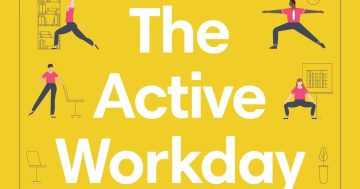Dan Schawbel* says artificial intelligence has taken over much of the mindless, routine jobs that once had to be done by humans — so why are we working harder than ever?
 The nine-to-five workday has been replaced by the always-available workday driven by advancements in mobile technology and a work culture that demands higher productivity at the cost of burnout.
The nine-to-five workday has been replaced by the always-available workday driven by advancements in mobile technology and a work culture that demands higher productivity at the cost of burnout.
During the pandemic, workers exchanged their commute time for more time spent working. More than half are working at least five hours more each week and more than a third are working at least 10 additional hours.
That time you spent driving, flying, or taking a train to work has been replaced by more work.
While companies have benefitted from record levels of productivity, the side effect is a heightened mental health crisis.
Two-thirds of workers said COVID-19 accelerated their willingness to invest in artificial intelligence (AI) tools.
These tools have supported the economy even during the deepest part of the recession, allowing workers to keep their jobs because they could remain connected to them.
Now, as the economy rebounds, leaders need to continue to invest in these tools, and a culture that reduces a workweek that has been stretched too far.
As evidence of our burnout culture, perpetuated by our reliance on technology, Harvard Business School found that workers spend at least 80 hours each week either working, monitoring work, or remaining accessible.
However, the same technology that we use to orchestrate our work lives can give us hope for a more efficient, shorter workweek in the future.
At least an hour of each worker’s day is wasted on tasks that aren’t related to their job, or administrative tasks that don’t drive business value. Add that to wasteful meetings and continuous back-and-forth to emails.
Our work lives were not supposed to be this chaotic. In the 1930s economist, John Maynard Keynes predicted that we would have a 15-hour workweek, giving people more time for leisure activities.
The technology we use is already removing tasks from our job descriptions without us even realising it, and automation will continue to devour administrative work, thus freeing up time.
However, if we continue to add work as we’re freeing it up, then we are destined to be mice running in a wheel.
While you may think that we are light years away from living in a world run by technology, think again. We are already using all of these tools without even realising it.
Think of the things computers are now doing that you’re not even questioning, whereas 30 years ago it would have been seen as sorcery.
You have a thing that fits in your shirt pocket that tells you how to get to grandma’s house and when and where the traffic is getting heavy; it will suggest routes to avoid the traffic without the involvement of a human being.
As someone who has a poor sense of direction, GPS technology has saved me on multiple occasions, while my iPhone has helped me stay in touch with people across the world.
Even though technology has reduced our time spent working, our workplace culture continues to beat the drum to overwork.
We are replacing the time we’re saving by using tech tools with more and more work, preventing us from the utopia that Keynes predicted long ago.
Much of this burnout culture is the result of the 2008 recession, which put pressure on companies to increase productivity with fewer (human) resources. The 2020 recession has continued to perpetuate and reinforce the pressure to work more hours at the cost of our health.
Working longer and harder has also become a badge of honour; saying “I’m busy” is now a form of social proof.
Chief Executive of Tesla, Elon Musk is a champion of burnout culture, having said: “Nobody ever changed the world on 40 hours a week.”
What he’s actually communicating is that if you want to work for his company, prepare to have work creep into your personal life and remain there.
Musk is one of many leaders who are trying to extract every ounce of time and energy from workers without regard to their personal lives.
The good news is that there is a workplace wellness movement to combat burnout culture.
The most notable is the four-day workweek trials that began a few years ago.
When asked how many days employees desired to work with their salary being constant, the most common response was four days.
During the pandemic, Seattle start-up, Volt moved to a four-day workweek, giving everyone Fridays off, which resulted in higher levels of job satisfaction and productivity.
Knowing remote work during COVID-19 would result in employee burnout, social media company, Buffer implemented a four-day workweek.
Buffer’s employees benefitted from more happiness, lower stress, and a higher sense of autonomy.
Entire countries have realised that a five-day workweek is unnecessary, and in many ways harmful, to their population.
New Zealand Prime Minister, Jacinda Ardern, one of the most effective leaders during COVID-19, says the four-day workweek is a way to rebuild the economy because it helps employees address “persistent work-life balance issues”.
Even with the surge in technologies that should have reduced our workdays, our workplace culture continues to fill our free time with more work.
We need to blame our work culture more than technology for our expanded workweek because culture drives much of our technology use.
As much as 45 per cent of all work activities can be automated with the technology we already have, saving us 18 out of every 40 hours worked and further proving that our culture is driving us to work more unnecessary hours.
We need to let technology do its job so that we can bring health and humanity back to where we work and live.
*Dan Schawbel is a recognised international authority on the future of work. He is the author of the bestselling book Back to Human: How Great Leaders Create Connection in the Age of Isolation.











